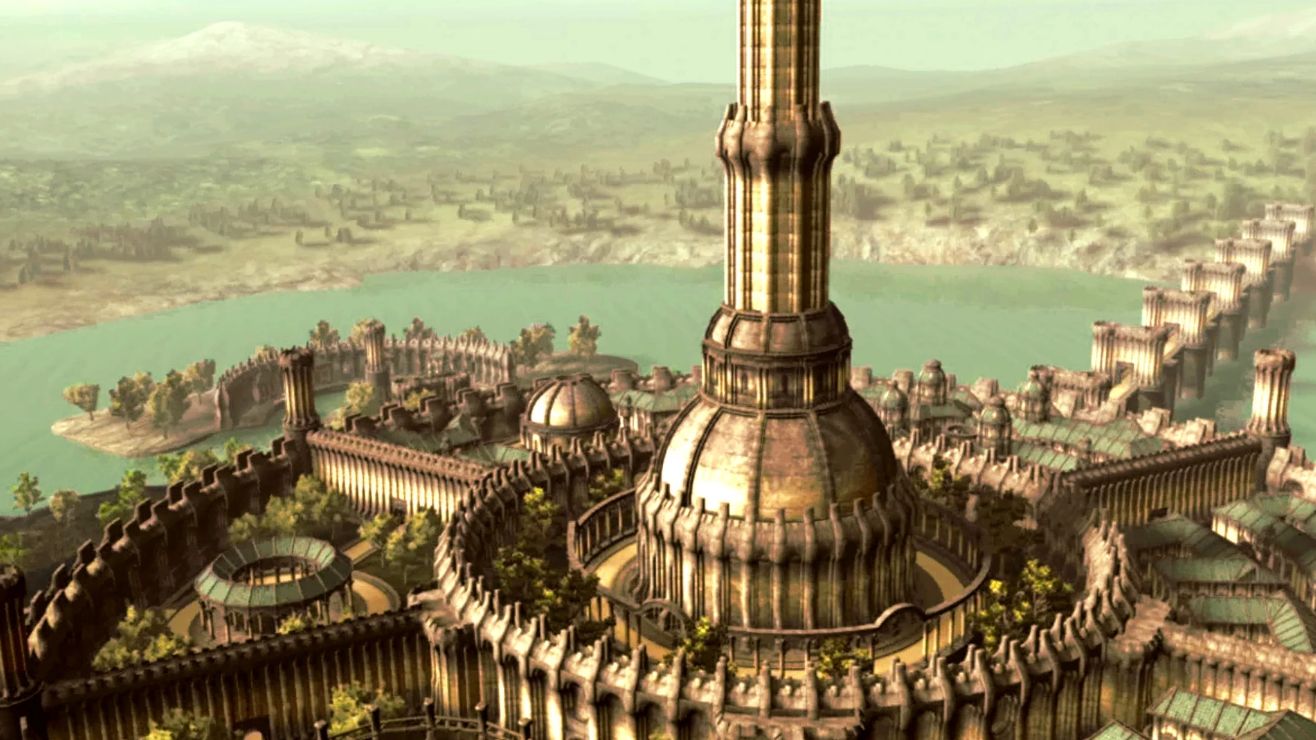Our Verdict
A liberating masterpiece.
PC Gamer's got your back
To celebrate the 30th anniversary of The Elder Scrolls, we published our original reviews of each main game in the series from our archives. This review first ran in PC Gamer UK issue 160, back in March 2006. We're resurfacing it in light of Oblivion Remastered.
The fourth Elder Scrolls game becomes the first to break the 90% score barrier. Tom's review makes it clear just how enamoured he was with the game. Where our Morrowind reviewer clearly struggled to become immersed in world, here Tom is spinning multiple first-person tales of his adventures off the beaten track, finding surprising and detailed adventures as he explored the edges of Cyrodiil. Today, Oblivion is often seen as the weird middle-child of the series post-Daggerfall—not as weird and uncompromising as Morrowind; not as dense and modern as Skyrim. But reading through Tom's review here, I can't help but feel the pull to return.
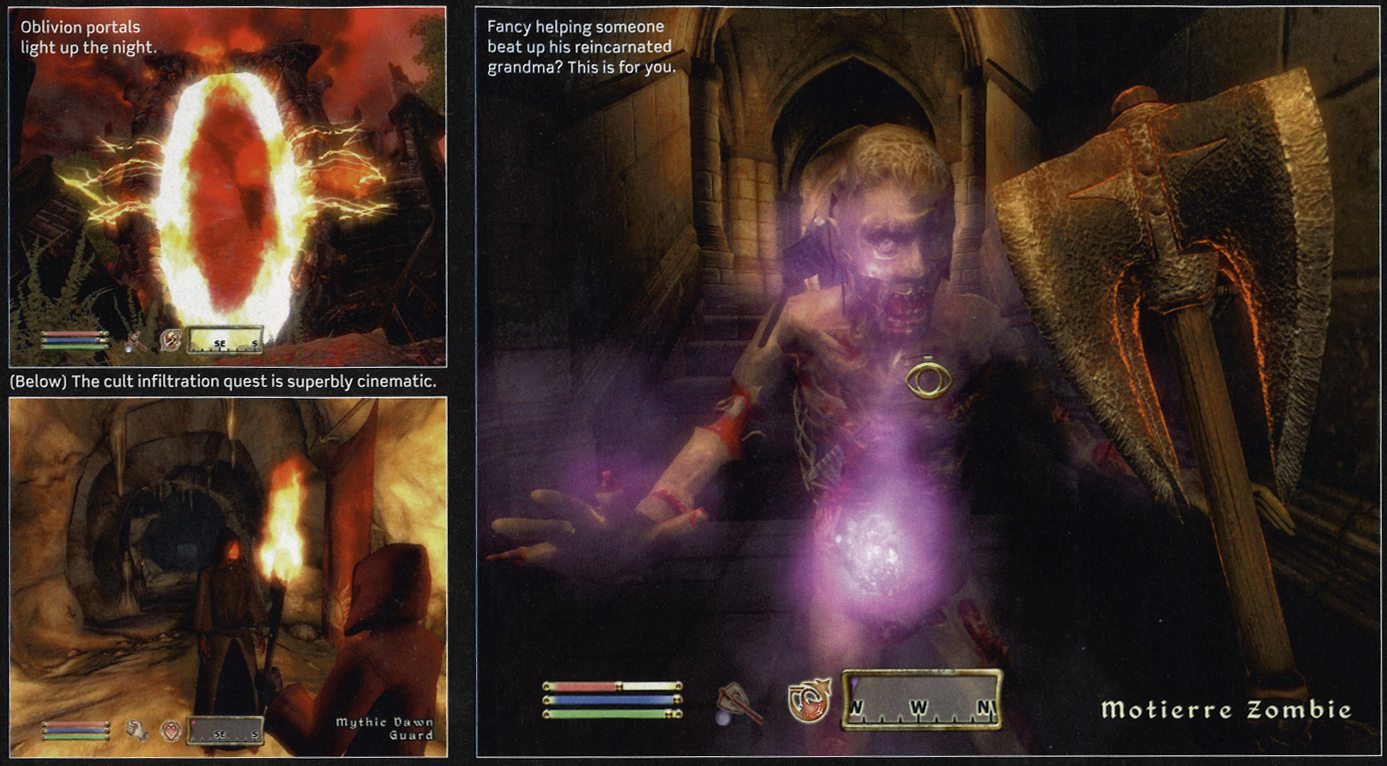
Developer Bethesda Softworks
Minimum system 2GHz CPU, 512Mb RAM, 128Mb 3D card
Recommended 2.5GHz CPU, 1Gb RAM, 256Mb 3D card
Release date March 24, 2006
Gleurgh. I have 'The Look' again. The slightly puzzled, blinking stare that seems to say "Where did my Mace of Embers go? Why am I now a pasty nerd instead of a lithe lizard-man assassin? What are all these metal monsters on wheels?" I can now only understand the modern world as a means of getting me back to Cyrodiil, Oblivion's vast and absurdly beautiful realm. I am told that if I write this review I will receive just enough gold to buy food until the 'weekend' comes and I can return.
Elder Scrolls games are about letting you loose in an enormous fantasy RPG world, giving you masses to do, and never forcing you to do any of it. You're given a main quest, generally involving saving the world by fulfilling a prophecy (an Elder Scroll), but if you get distracted working for guilds or helping out the locals, you can happily play for months without touching the main story. The point of that freedom is not just to give you options, it's that once you've become the most accomplished thief in the realm, you can then start life as an assassin, or a fighter, or finally get round to saving the world. Your character's life becomes a unique story, eventually an epic. Don't let the back of the box—or me—tell you what the plot of Oblivion is. We don't know what you're going to do.
The philosophy of the Elder Scrolls games is also about making the fantasy RPG more immediate and involving—everything's first-person, real-time, and physically modelled. You dodge fireballs by actually jumping out of their way, not by the game making an off-screen 'evade' roll on digital dice. Your arrows strike home or miss by virtue of your accuracy, not your character's. And your blows hit because you managed to connect with the enemy, not because you have a high sword skill. It's what passes for realism in a swords-and-sorcery setting, and it's a massively more engaging way of drawing us into a fantasy world than anything involving turns or dice-rolls.
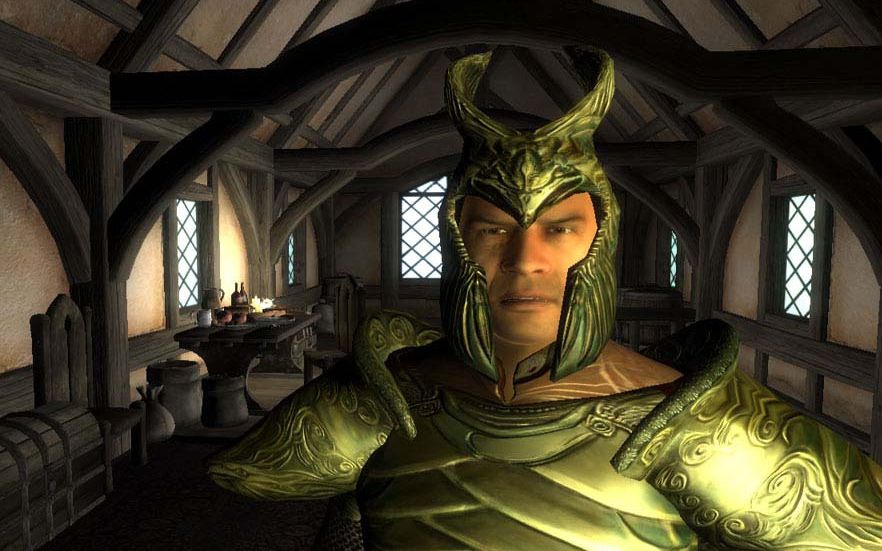
Previously, Elder Scrolls games have shown that a game like this could work superbly. Oblivion is that game. You don't have to imagine how first-person combat might become truly skill-based and exciting, it smacks you in the face like a warhammer. Of course magic should be as powerful and spectacular as firing heavy ordnance in an FPS—look at the way you just blew that imp into a sea of lava. The idea of forcing the player down a single pre-defined storyline seems absurd when running off and becoming an assassin for a week is this much fun. And how can you play games that restrict you to certain areas once you've cantered the length and breadth of mountainous, densely wooded Cyrodiil? This is one of those rare and wonderful treats of gaming that's so recklessly ambitious and staggeringly accomplished that it makes even great games, its predecessors included, seem small-minded and clumsy by comparison.
But the real joy of Oblivion isn't in those details. It's in the story of your character's life, the madcap path on which you career drunkenly through the game's endlessly exciting possibilities, flitting from quest to quest. That part is tough to generalise about, and it probably wouldn't give you much of an idea of the antics you'll get up to anyway. It would be more informative—and more importantly, fun for me—to recount some of my adventures, the antics of Pentadact the lizard-man assassin turned thief turned saviour of the world.
Buffy's Bluffing
Listening to the locals natter in the tavern, it seems a vampire has been found in Bruma. Bradon Lirrian, a quiet villager never seen out during the day, has been identified by a professional vampire hunter and slain. His widow is unconvinced: Bradon just worked nights. The Imperial Guard insist the vampire hunter Raynil can be trusted—he made a name for himself rooting out a nasty one in the capitol city. Raynil proves a hard man to find, but a local inn-keeper knows more than he's saying. I bypass the sweet-talk, slip the room keys out of his pocket and check for myself. Sure enough, Raynil stayed here. The diary I find is that of the very 'vampire' he made his name slaying, and it's soon clear that he was no vampire at all. The diary describes in detail how all three men discovered an artefact while adventuring together, stashed it in a triple-locked chest, and each kept a key.
"I didn't expect you so soon," Raynil spits inches from my face as his invisibility spell flicks off.
The guards are finally persuaded that the case sucks and tell me Raynil was spotted travelling in the direction of a nearby cave. I saddle up and ride out at dawn. I dismount a good distance from the entrance and creep the rest of the way. Stealth, my friends. The cave floor's wet inside, but a master like me is still near-silent when—aaaarrghh!
"I didn't expect you so soon," Raynil spits inches from my face as his invisibility spell flicks off. "I heard you were asking about me." I jump back, but his two-handed golden sword is too fast. The man's a machine. His blade hacks at me relentlessly, sending me reeling every time I lower my guard to try and get a hit in. My weapon's broken from blocking by the time I get in a few good hits, so they're mere punches. I turn tail and run back outside, hammering my heal spell. He follows, and is floored hilariously by two hooves in the face from my pale steed Binky. He turns to fight the poor beast, and the moment's respite gives me time for reflection: my punches have left him weary, or he wouldn't have fallen. That means one more fatiguing blow will likely floor him again. I rummage through my alchemical equipment and quickly knock up a Poison of Weariness, apply it to an arrow and back off to the nearest sheer drop as he charges for me. I hold it for as long as I can, then sidestep his pouncing attack and release it point-blank into the side of his head. He collapses just on the brink, I snatch his sword before it even settles on the ground, apply the same poison to it and rob him of the three keys he stole. Just as he starts to pick himself up, his own sword smashes him over the edge, and I toss it down after him. I'm no good with blades, really.
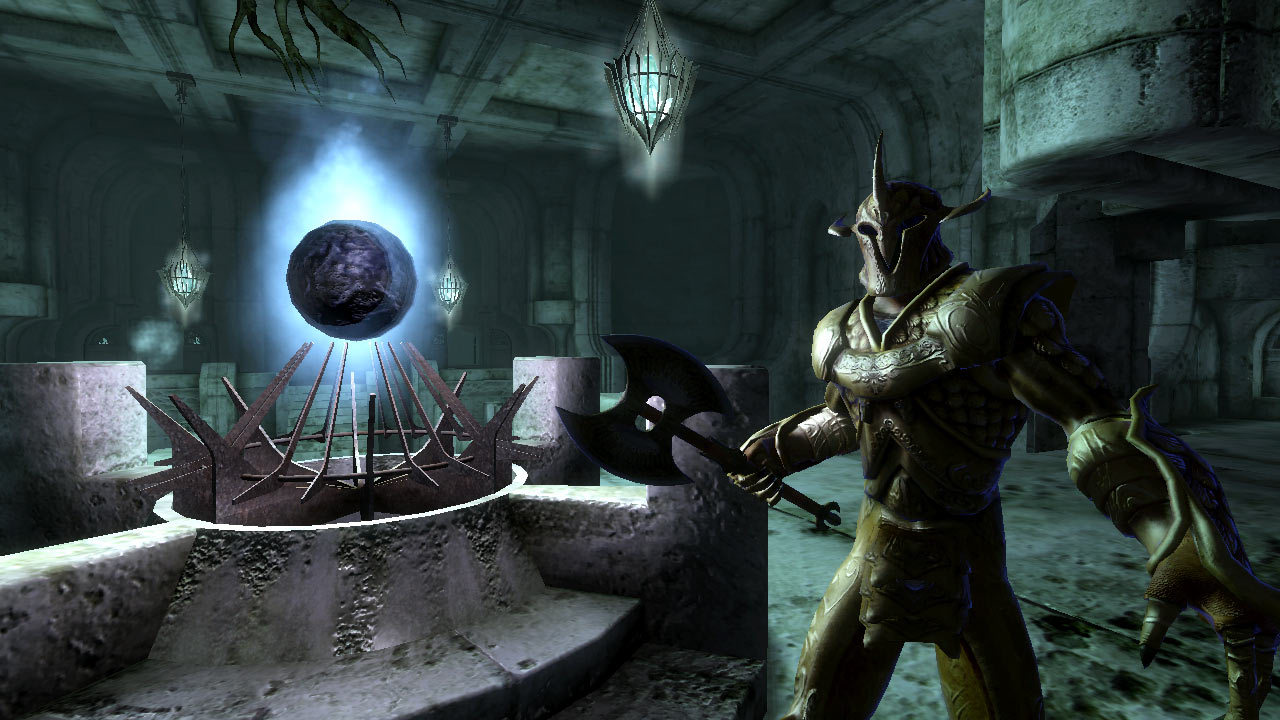
The way quests come to you in Oblivion is much more natural than the awkward strangers-asking-favours system of other RPGs. In the main quest you've been singles out as the one prophesied to find the heart to the recently vacated throne of the empire, so characters are helping you to that end. Signing up to a guild gets you work, for which you are paid, but incidental quests such as the one above are the result of you following up leads you overhear. No one asks you to expose that corrupt vampire hunter, you do it of your own volition when the evidence you stumble on starts to sound suspicious. It's surprising how much more engaging quests are when your involvement with them makes sense. It's even more surprising that every quest is as intriguing, story-rich and duplicitous as the case of the phony vampire hunter. No task is as simple as it sounds, every one draws you into the personal lives of several characters, and most turn into multi-part investigations that build to a heart-pounding climax—be it a duel, theft or daring getaway.
Combat is often tough, particularly for a jack-of-all-trades character like mine, but the generous array of options at your disposal means there's always a way to win. Blocking at the right time and strategic use of heavy blows, after which you're vulnerable for a moment, will only get you so far. Beating a tougher character generally means backpedalling frantically as you stick arrow after arrow in his chest, suddenly remembering a spell that can incapacitate or calm him for a minute while you heal, vanishing into thin air with an Invisibility scroll, or mixing up an impromptu poison or potion tailor-made for the occasion. When your resourcefulness does triumph, ragdoll corpse-physics makes the killing blow hilariously brutal. Whether it's a mace batting them into the wall, and arrow nailing them in mid-air as they pounce, or an Electric Touch spell blasting them across the room in spasms, the sight is so wonderfully unpleasant that you have to stifle a cry of appalled delight every time.
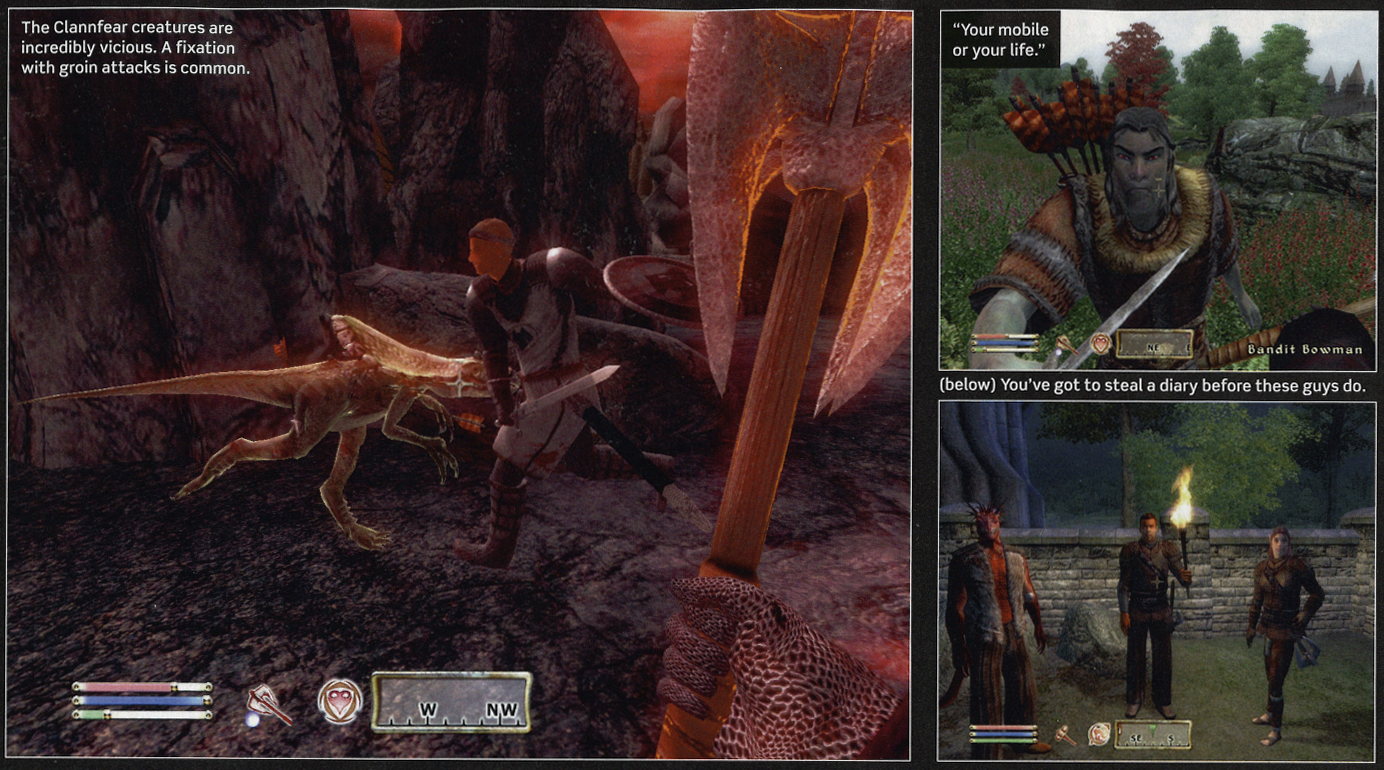
Out-of-town encounters can be reached on foot, but riding out on horseback at dawn is one of the game's greatest pleasures. The others are riding out at dusk, riding out at night and riding out at midday. The lofty viewpoint, the heavy clopping of hooves, the shaggy mane where a gun would be in an FPS… it's all so right for a fantasy game. Happily, horses are not the reserve of high-level characters: you're given one not five minutes into the main quest. From the first time you saddle up and canter off into the green beyond, nothing else makes sense. How could we ever have been satisfied walking everywhere? The game has an efficient fast-travel map where you can click any major location you've previously visited to appear there, but you'll find yourself forgoing it for the pleasure of putting your horse into cruise control and spinning the camera around to admire your handsome profile against the epic landscape.
Cult Following
I hop off Binky when I find the Mythic Dawn cult's cave, put on my best crazy cultist face and walk in. Just by finding their HQ I've passed the first test, and they're keen to let me in before the grand speech begins. First, though, I have to surrender all my possessions and don a cult robe. I play along. I'm a professional thief, so the parting is likely to be temporary. In fact, by the time my host turns round I've already pickpocketed my black robe and hood back from him and I'm wearing them again. I hoped for a slight frown of confusion on his face before he let me in, but he plays it cool.
At my touch, the man goes rigid, keels back and crashes down the stairs. I loot my stuff
My plan to mug the leader for the amulet I need is scuppered when he vanishes to another dimension at the end of the talk. But the only copy of their most holy text is right there on the dais, and I'm not leaving without it. To get even close I have to prove my devotion by relieving a sacrifice of his life, but that's old hat to me: I used to be an assassin. There's no way I can take the book unseen, though, so this is going to get messier than I usually like. First things first, I need my stuff back. Even I can't get it all off my host without alerting him, so it's time for my personal favourite: The Lover's Kiss. At my touch, the man goes rigid, keels back and crashes down the stairs. I loot my stuff from his paralysed body as everyone in the room conjures demonic armour over their robes and runs for me. I whack the closest with my newly recovered mace, jump over their heads and snatch the holy text. I am Indiana freaking Jones. Now I just have to get out of here.
The Mythic Dawn are Oblivion's official bad guys, responsible for assassinating the Emperor and stealing an amulet that gave the whole world protection from demonic invasion. The main quest is to get the amulet to the new emperor Martin Septim (voiced excellently by Sean Bean, no stranger to having a ridiculous name), since it only protects the world when worn by someone of Imperial blood. With the two separated, fiery portals to Oblivion (Elder Scrolls' hell) are bursting all over the world, and demonic hordes spilling out. The sheer variety of the tasks required of you to remedy this is exhilarating—one minute you, the new emperor and his personal bodyguard are hacking up assassins together. The next you're rushed to a temple refuge in the snowy peaks of Cyrodiil's mountains for a hasty coronation ritual. Then you're partnering up with a fellow Imperial agent to steal the cult's holy texts from all across the capital city, and the clues gleaned there lead to the mission above. It achieves what ought to be impossible in a freeform RPG—a ferocious pace. You could go off and do something else in the middle of all this, but the action is so compelling that it simply never occurs to you to try.
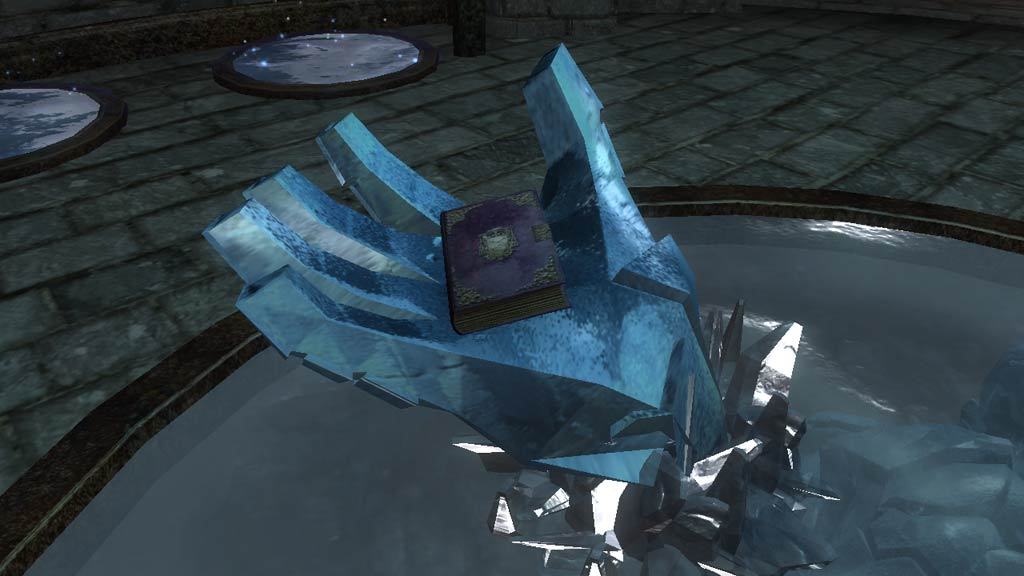
Bethesda have gone to great pains to keep the look of the Oblivion dimension itself secret until now, but the great reveal is a slight anti-climax. It's a bit of a mish-mash: a martian landscape littered with hostile plants, chunks of ruined buildings, oceans of lava and tall towers. Pretty, but ultimately nothing we haven't seen before in gaming's many visions of hell. For a lot of your ventures there, you're leading a handful of Imperial soldiers. They don't do much more than follow you and fight off anything they see, but it's great fun to watch them mob a lowly Scamp, and even more fun to see them get smashed to death by a huge reptilian Daedroth demon. With or without them, your objective is always to find a Sigil Stone, the magical artefact that holds together the plane of Oblivion you're in. Snatch it and you're spat back out into reality, portal closed. As a bonus, you can use the Sigil Stone to enchant your weapon with an unpleasant effect. There excursions build to intense climaxes as the demons come thicker and faster closer to the stone, but you'll always be glad to get back to your more varied real-world adventures.
A Dark and Stormy Night
I've been invited to a party, my Dark Brotherhood contact tells me. Five other guests and I will be locked in a mansion, and tasked with a little treasure hunt: somewhere in the house is a chest of gold. That's what the other five guests have been told. In fact, their absent host is someone they've each wronged in the past, and he's inviting me to kill them. If I want a bonus, and I do, he has a very particular way he'd like them to die: surprised. No one can know I'm the murderer. He wants the survivors to become increasingly terrified as the other guests drop like flies. This is my kind of client.
If I want a bonus, and I do, he has a very particular way he'd like them to die: surprised
It is, by sheer serendipity of the day/night cycle and weather system, a dark and stormy night. I get chatting to the other guests, my Deceiver's Finery—my last bonus—boosting my persuasion abilities. It seems one young lady has taken a shine to a handsome Imperial at the party, so once she trusts me I make a suggestion: go to his room, he'll be up in a minute. After a moment I creep up after her, close in and snap her neck. After dragging her body into the bedroom and closing the door, I return to the party and turn my charm on the next victim.It's deliciously evil. Each has some weakness or need you can manipulate into an excuse to get them alone, each goes down with a single jab to the jugular, and none of them ever knows the killer until the last man, who's too drunk to work it out anyway.
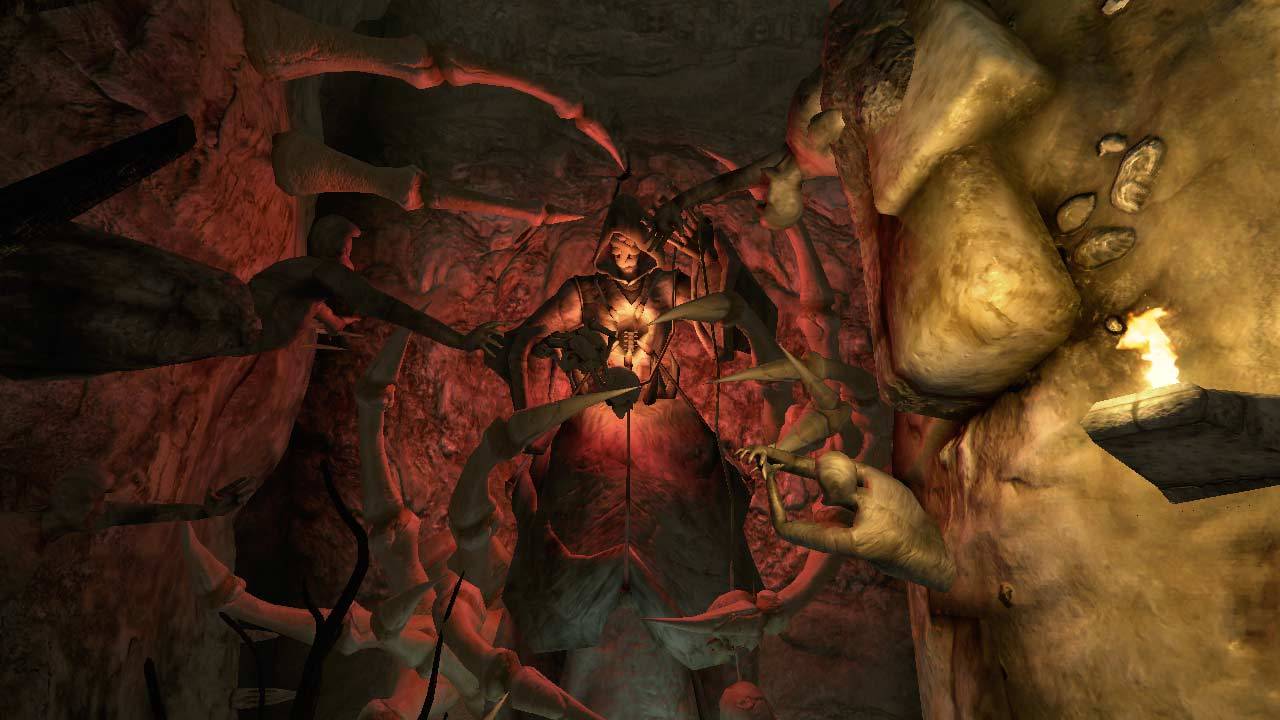
The Dark Brotherhood are the unofficial assassins' guild, and their 'contracts' are some of the best quests in the game. You'll wake up to find their contact standing over your bed the night after you first kill someone in cold blood. The missions that follow are a glorious blend of the best elements of the Thief and Hitman games. Each contract promises a special bonus item if you perform it in the precise manner the client prefers. Make the death look like an accident by loosening an ornament above your target as he sits in his favourite chair. Send a message to the successor of the Imperial officer you just killed by cutting off his finger and sneaking it into his replacement's desk. Kill a sickly old warlord by switching his medicine with a poison, making his doting servants think he succumbed to the illness. The tasks themselves get more elaborately cruel as they go along. The job recounted above was my last: the next multiple assassination I was give was so diabolically ruthless that I simply couldn't bring myself to do it. I won't spoil it for you, but if you can do it, you're a colder killer than I.
A Ring of Thieves
A impoverished cat-woman is missing a ring. She tells me she suspects a sneaky Argonian named Amusei, and suggests I 'take care' of him while I'm retrieving it. I'm not wearing my Dark Brotherhood hat (hood, actually), so killing is off the table, but I agree to get the ring back. The Argonian proves tricky to locate, though—he's not in his house or at any of the town's inns. Then a friend of his informs me that he was arrested. A minute later I've slipped the key from the jailor's pocket and I'm visiting Amusei in his cell. He doesn't have the ring—he was arrested not for stealing it from the cat-woman, but because it's the property of the local Countess. She's so happy to have it back that she wears it all the time.
I'm cantering along the shores of a moonlit lake when it hits me, along with three more arrows
Except at night, as her handmaid informs me after I've buttered her up. I break more than ten lockpicks before the jewellery box yields to me, each snapping with a tiny noise that seems deafening so close to the sleeping countess's ears. At last, the prize is mine. Before I leave, I can't resist relieving her and the count of their personal wealth. He wakes up.
I run. The guards give chase. I make it out of the house with only a few arrows in my back, but now the whole town guard is after me. At the gates to the city I hop on a horse that isn't strictly mine and gallop off into the night, but when I look back I see that the guards have mounted up too. This is getting serious. If I don't shake them, I can't get to Bravil to see my Thieves Guild contact about losing the heat. I'm cantering along the shores of a moonlit lake when it hits me, along with three more arrows. My Sharkskin Boots. The one thing Jesus and I can do but the law can't: walk on water. Ripples spread gently out from every footstep I take on the lake's dazzling surface. The guards sit dumbfounded on their mounts as I escape, wondering if they can arrest my horse.
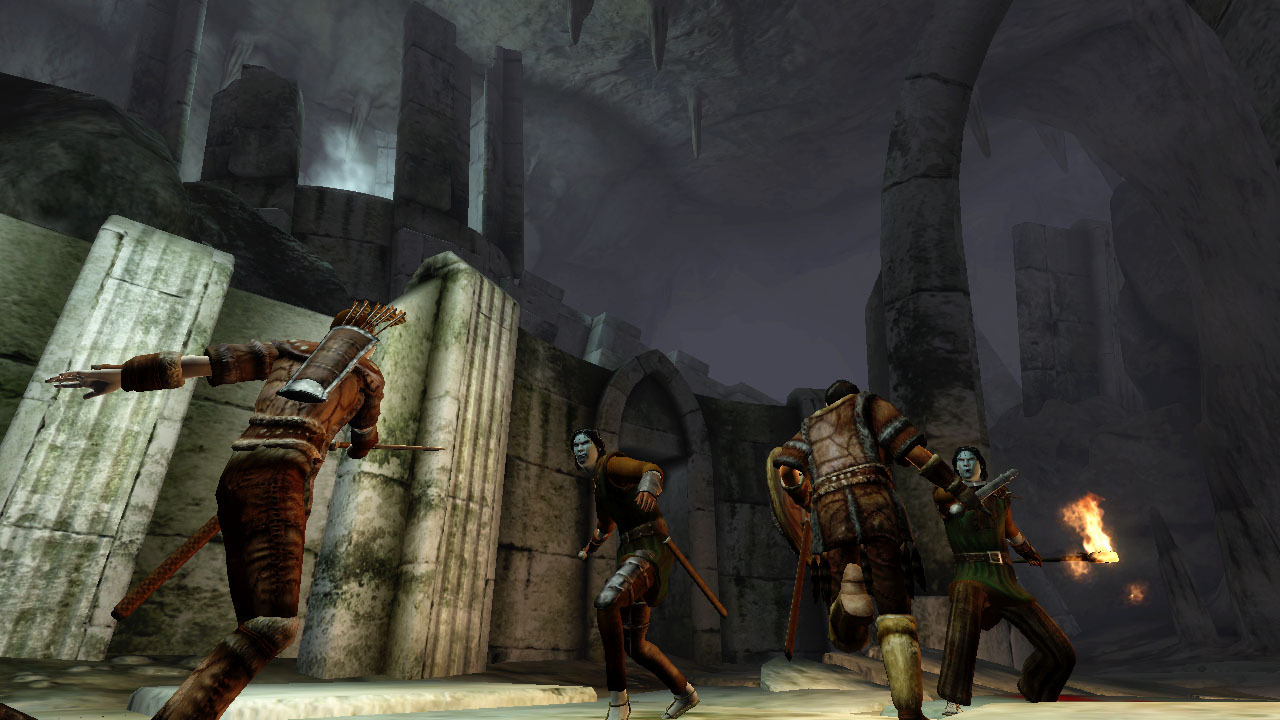
Cyrodiil's NPCs all have daily schedules, going from home to work, church, the shops or the tavern whether you're around or not. Waiting for the Countess to put her ring in her jewellery box and go to bed is about as far as these schedules ever influence your questing, but the impression that these characters have lives makes them feel more convincing as people. Sadly, the illusion is shattered when they try to talk to each other—the AI controlling who they speak to and what they say is terrible, and Oblivion's only real problem. Never mind that casual conversations are hilariously forced exchanges such as:
"I hear Errandil is good with a lockpick."
"I heard he's good with locks."
"That's what I heard."
"Good day."
The bigger problem is that the characters don't know whether they're meeting someone for the first time or have just finished talking to them, whether the two people next to them are having the exact same conversation, or how many times the player has heard the exact exchange they're about to have. You'll even hear the same lines in different voices, making it impossible to pretend they're anything other than actors reading a script. It's a particular shame because the scripted one-off conversations relating to quests are excellently written, and together with the daily schedules would have given Oblivion's inhabitants plenty of life. Instead the hard work of the writers and AI programmers is ruined by a single sloppy algorithm.
There are other problems with Oblivion's NPCs—they'll occasionally steal things in front of everyone for no good reason, their facial animation ranges from basic to non-existent, and some of their faces are downright ugly (including that of Patrick Stewart's character, sadly). But none of these things annoy after the first time you notice them. Only those wretched background conversations keep coming back to spoil the suspension of disbelief—the main reason Oblivion wallows in the slum of the low 90s instead of its rightful place at 96%. Bethesda haven't got people right yet, and until they do they'll never make the perfect RPG.
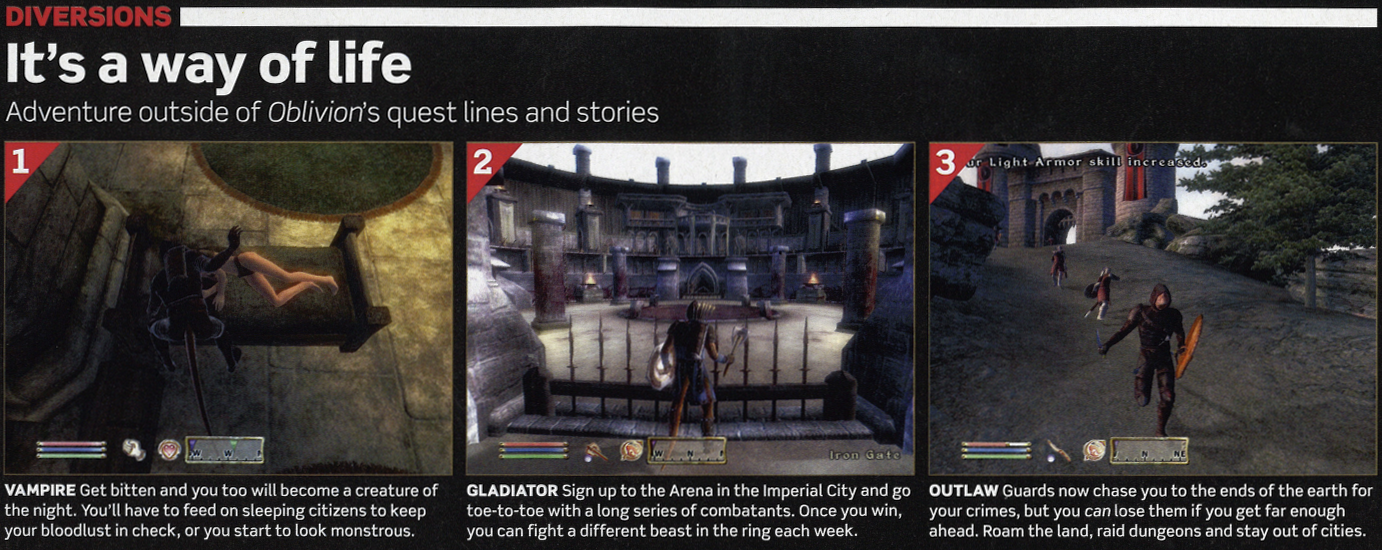
Instead, Oblivion is a messy masterpiece; accomplished, bold, huge and occasionally rough around the edges. Your adventures are more varied than those of any other game I could name, and magnificently rendered by the game's powerhouse graphics and physics. The scenery has more in common with the Lord of the Rings films than with other games. The fights are so visceral you'll flinch at the blows. Magic is beautiful and devastating. The adventures themselves are intricate, emotional stories masterfully told, and given a new twist by your own actions.
One other journalist was playing Oblivion alongside me, and in the first 30 hours of play there was only a single quest we both took on. In every other way the things we saw and did were different. Some people will say they don't have time for a game that huge and immersive, but Oblivion players will just laugh. You think we had time? Once you start, everything else just loses importance. Suddenly you've called in sick, your girlfriend or boyfriend has given up on you, and all you have is sweet, blissful Oblivion.
A liberating masterpiece.
You must confirm your public display name before commenting
Please logout and then login again, you will then be prompted to enter your display name.
